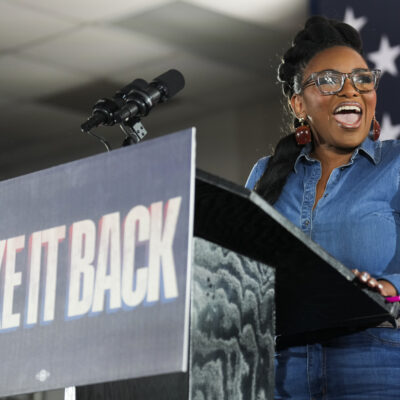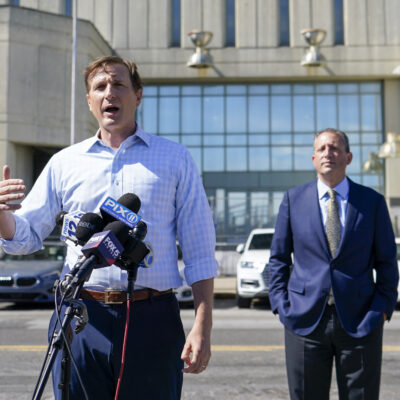
knesset spokesperson
Israeli Diaspora Minister Omer Yankelevitch is up for a challenge
After six months in office, Yankelevitch is optimistic and enthusiastic about the mammoth task of uniting Israeli and diaspora Jewry
Omer Yankelevitch has lofty ambitions for uniting Israeli and diaspora Jews.
Six months into her job as Israel’s diaspora affairs minister — and with the future of the current government, and therefore her tenure, in jeopardy — Yankelevitch is optimistic and enthusiastic about taking on such a mammoth task.
“I see the Jewish nation as 15 million Jews, not 7 million [in Israel] and 8 million [abroad],” she told Jewish Insider in an interview earlier this month in her Knesset office. “We’re 15 million Jews, and that’s powerful. We can have an incredible power, if we can look at ourselves as one big group — that may have disagreements, and that’s OK, that’s part of the story, it could be that we won’t always agree, and sometimes we’ll agree to disagree, and that’s also OK, sometimes we won’t even agree to disagree, and that’s OK too — but if we see ourselves as one big group, we will benefit from that. And that’s what I intend to invest a lot in, in building that connection and creating that partnership.”
Yankelevitch, 42, entered the Diaspora Affairs Ministry during a particularly challenging and restricting period for Israeli-diaspora relations, as the COVID-19 pandemic hampered not only her own travel but also largely put a halt to Jewish groups and officials visiting Israel.
“It has been six very challenging months. This is not a normal period,” she said. “I came into the job with a lot of ambition, with a sense of mission.” The first thing she did, Yankelevitch said, was to figure out “how do I transfer everything going on in this office immediately to the world of Zoom, to the world that is practical for this incredibly complicated period?”
And that transformation, she said, has also had its upsides.
“On September 1, on the first day of school in Israel, I visited three schools [in Israel] for their openings — and then I sat down and I was in Helsinki, Germany, France and Uruguay,” she recounted. “In no normal year would I be able to open the school year in so many different places.”
For the first time since she took office in May, Yankelevitch traveled abroad last week, spending three days in Los Angeles meeting — while socially distanced — with Jewish community leaders and officials in and around the city.
“We decided that despite all the difficulties we want to travel” abroad and meet face-to-face with diaspora Jews, Yankelevitch told JI shortly before her departure. After a whirlwind 72 hours, including meetings on college campuses, and with officials from the Simon Wiesenthal Center and the Anti-Defamation League, the minister returned to Israel last week with a heightened sense of purpose.

Israeli Diaspora Minister Omer Yankelevitch meets with members of the USC Chabad during a recent trip to Los Angeles. (Courtesy)
In a statement to JI after her trip, Yankelevitch said her first visit abroad “highlighted the community’s desire to engage in conversation and build relationships between the Jewish people despite the limitations of COVID-19… these meaningful interactions gave me the opportunity to listen and understand more deeply the unique interests, needs and concerns of the Jewish community,” something she said will “inform my office’s work as we finalize our budget and activities.”
***
Yankelevitch, a member of the centrist Blue and White Party headed by Defense Minister Benny Gantz, made history — and headlines — when she was sworn into office earlier this year as the first-ever female haredi government minister.
“I’m very proud of my background, I’m very proud of the place I come from,” she told JI. Her own inclusion in the political system, she said, is part of the larger story of “excluded populations, marginalized societies, becoming an integral part of the conversation. And I think it is in Israel’s national interest to allow and encourage excluded populations to become part of society.”
Born in Tel Aviv to secular parents who immigrated to Israel from Eastern Europe, Yankelevitch’s family began to embrace religious Judaism when she was a child, and they later moved to Bnei Brak. After completing her studies in Bnei Brak, she received a teaching certificate from the Gateshead Seminary in northern England, and she also joined her parents teaching Hebrew and Jewish studies in the former Soviet Union as a teenager.
Before her entry into politics, Yankelevitch — a lawyer by training who worked as a state attorney for several years — founded the Just Begun Foundation, which works to integrate peripheral communities in Israel into mainstream society, with a focus on the haredi world. Today she lives in Ramat Beit Shemesh with her husband and five children.
“I’m proud of my place as a haredi woman in Knesset, and I’m trying to use it as a bridge between worlds,” she said. “I think it’s an opportunity to be attentive to different populations and to give them a chance — because there are many people who can be meaningful in society” but who are not usually given a seat at the table.
She said that her previous nonprofit work was aimed at that same goal. “I worked with Druze and Bedouin populations out of the understanding that this is our story, our story is the entirety, the totality of all parts of society,” she said, adding that she hopes people will appreciate that “davka someone who comes from the ultra-Orthodox community wants to create that unifying dialogue.”
Yankelevitch dismissed the notion that the non-Orthodox streams of world Jewry would be put off or discouraged from working with her due to her haredi background.
“I hope they will get to know me and know that I speak to all Jews around the world,” she said. “From my perspective, we all need to sit around one table and to find the things that bridge and unite us. Those who already know me already know that that is my worldview, and that’s where I come from.”

Yanekelevitch speaks in the Knesset. (Knesset Spokesperson)
Rabbi Rick Jacobs, president of the Union for Reform Judaism, told JI that he has had “a number of very positive discussions with Minister Yankelevitch” since she was sworn into office.
“When she became Diaspora Affairs Minister, some wrongfully assumed that because she herself is ultra-Orthodox that she would not be open to liberal Judaism, but that has not been my experience,” Jacobs added. “I find her interest genuine and her curiosity refreshing. She acknowledges that she has much to learn about us, which has led her to invite the leadership of the Reform movement to share with her our work and strength.”
Eric Fingerhut, president and CEO of the Jewish Federations of North America, echoed that sentiment.
“She began reaching out immediately, and she’s stayed in touch, it’s been an active conversation,” Fingerhut told JI. “She’s been accessible to us, she knows we’re accessible to her — it’s really been a very, very positive relationship. Everyone I’ve spoken to in the Jewish communal leadership across North America has been impressed.”
***
Yankelevitch is notably press shy; she agreed to an interview with Jewish Insider after five months of requests, and prefers to express herself in Hebrew despite her studies abroad. Multiple news outlets wrote profiles of the new minister without her participation. Her reticence is somewhat understandable in light of the controversy that has dogged her short political career, including a leaked tape of a Blue and White advisor citing Yankelevitch as insulting Gantz, and repeated rumors that she would defect to Likud, something she has consistently denied.
In conversation with JI, Yankelevitch came across as deeply passionate about her goals for the ministry and her desire to unite Israeli and diaspora Jews. She also obliquely acknowledged that her time in office could be limited, as Israel teeters on the edge of another coalition crisis.
“If there’s one thing that I feel that is my dream to accomplish during the period that I’m here — and you never know how long it’ll be — it is my dream to succeed in creating greater connections within Jewish society in Israel and around the world,” she said. “Every time people try to get me into debates on issues of conflict, I say, ‘don’t worry, we’ll talk about that, because it won’t go anywhere, but let’s find five things that unify us, that unify the Jewish nation. Let’s talk about those first.’”
But when asked to specify what she has accomplished over the past six months, Yankelevitch is less detailed. She points largely to two things, the first of which is a shift from focusing on individual projects to building an overall strategy.
“When I came in, I said what we’re doing is changing everything from projects to strategy,” she told JI. “We have a clear strategy, that I’m not ashamed to state, we have a responsibility as the State of Israel… to operate from the perspective of ‘kol Yisrael arevim zeh bazeh’ [all of Israel is responsible for one another]. It’s not a cliche, it’s a statement that I stand behind, that dates back to Israel’s Declaration of Independence — that’s our message, that our responsibility to the Jews of the world has always been there.”

Yankelevitch meets with Dr. Sharon Nazarian, senior vice president of international affairs at the Anti-Defamation League, in Los Angeles. (Courtesy)
The other accomplishment Yankelevitch cites is her announcement last month that she intends to submit a bill to the Knesset to require government ministries to consult with world Jewry before making decisions that affect the diaspora. The minister’s office announced the proposed legislation on October 22; as of press time the bill, which is based on a draft law from Blue and White MK Tehila Friedman, has not yet been officially proposed in the Knesset.
“We’re working on it, it’s complicated. The legal advisors are writing it and we are seeking advice from all sorts of officials and leaders to hear their positions and opinions,” said Yankelevich of the process, which included a virtual discussion held this week with relevant figures. “I see this step as a very, very significant step in our relationship with the diaspora,” she added. “It makes a statement that there has to be a body which is consulted for advice on issues that are related to diaspora Jewry.”
When pressed on the details of the body’s formation and the exact method of consultation, Yankelevitch said those specifics are still being worked out. Asked why she is seeking to create a new body, instead of working with the World Zionist Congress — which elects representatives from Jews around the world and holds seats in the Jewish Agency, Keren Hayesod and Keren Kayemeth LeIsrael-Jewish National Fund — the minister stressed the need to start from scratch.
“We’re not hiding behind national institutions,” she said. “In the past there are those who said, ‘Oh the Jewish Agency will deal with the Diaspora,’ but no, we have a responsibility as the State of Israel, and we’re building the body that we want to consult with, we’re working in partnership with everyone.”
In her announcement of the legislation, Yankelevitch cited contentious topics including non-Orthodox prayer at the Kotel and the debate over conversion as issues that have divided Israeli and diaspora Jewry. North American Jewish leaders — including Jacobs and Fingerhut — have praised the initiative. But the idea has already received some pushback within Israel, and local political observers indicate that Yankelevitch will face an uphill battle in seeing the law passed by the full Knesset — even if the parliament isn’t dispersed before the end of the year.
“I don’t think the bill has a chance of advancing anywhere,” Tal Shalev, chief political correspondent at Walla! News, told JI, pointing to the current political gridlock preventing any bills from moving forward as Likud and Blue and White spar over the state budget. But in addition, she said, “it’s such an explosive issue for the haredi parties, it’s hard for me to imagine that they wouldn’t veto it, even if it does ever advance to the Ministerial Committee for Legislation.”
But Yankelevitch is enthusiastic — and vehement — that this is the best approach.
“What we need to do in this period is to create a dialogue between Israeli society and the diaspora, to listen and to create this partnership, a partnership that can be built only through dialogue,” she told JI. “This is a historic undertaking, that gives us an opportunity to listen, because until now such a thing didn’t exist. We have an opportunity to create this dialogue — that’s the story, that’s the historic process.”






